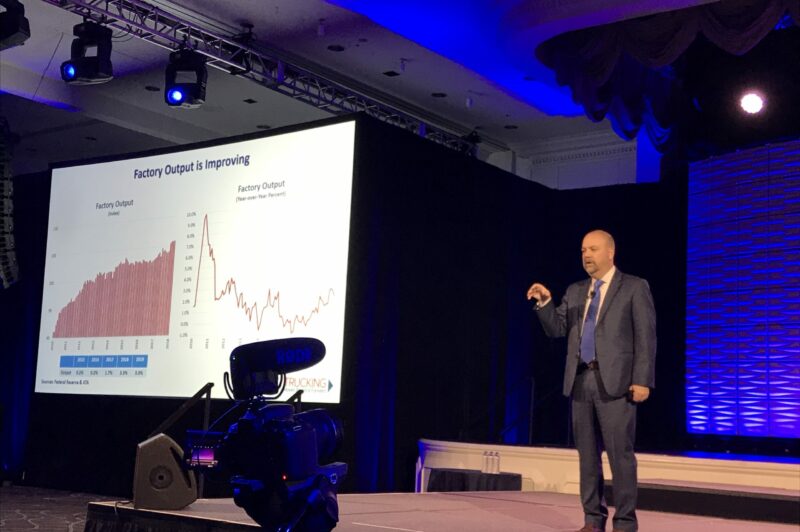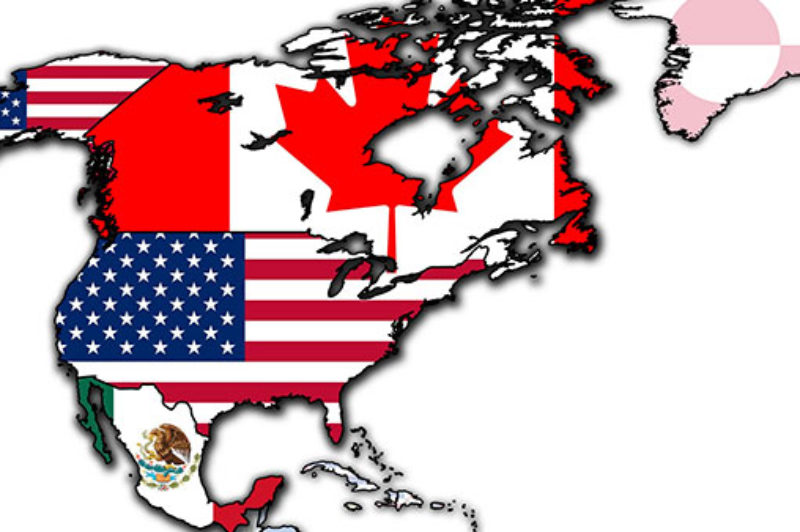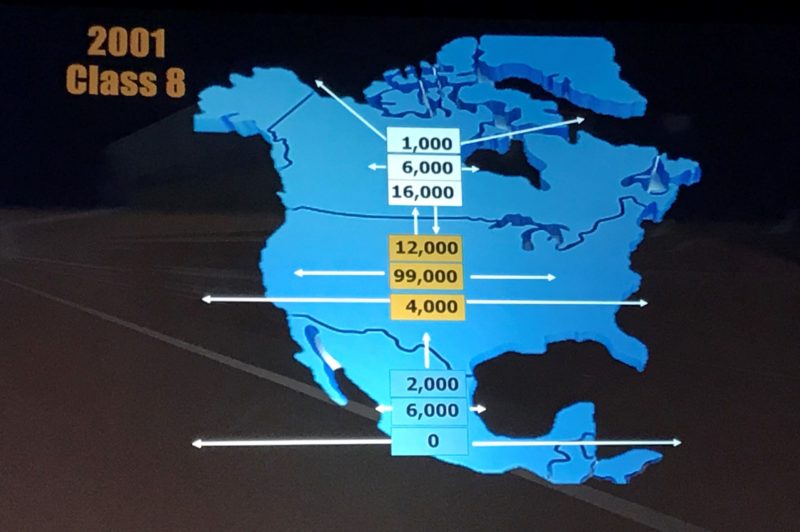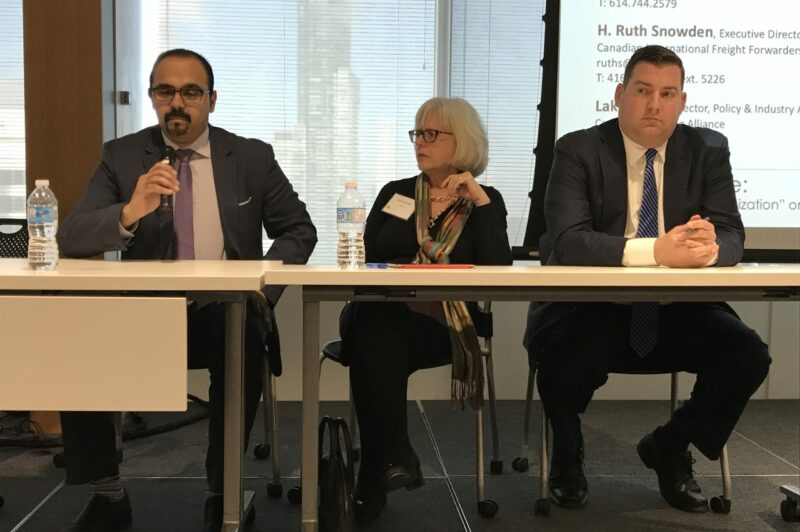NAFTA

Trucking is growing, but watch NAFTA and driver shortage
NASHVILLE, Tenn. – Trucking activity is surging thanks to an array of economic factors in the U.S., but there would be a steep price to pay if U.S. President Donald Trump follows through on threats to pull out of NAFTA. “NAFTA trade via truck supports over 46,000 jobs in our industry, including nearly 31,000 truck driver jobs,” the ATA's Bob Costello observed during Omnitracs’ fourth-annual Outlook conference.


NAFTA transformed truck making
LAS VEGAS, NV – U.S. President Donald Trump continues his threats to pull Canada’s largest trading partner out of NAFTA. But when it comes to heavy truck manufacturing, Canada may have experienced some of the biggest losses. “If I were Canada, I’d be upset because all the business is gone,” observed Stu MacKay of MacKay and Company, sharing statistics during the annual Heavy Duty Aftermarket Dialogue in Las Vegas.

NAFTA deal still in question
TORONTO, ON – The future of NAFTA remains uncertain as negotiators prepare for their latest round of meetings, this time in Montreal. Months into discussions, nobody even knows if U.S. President Donald Trump will decide to outright scrap the deal that governs every load of cross-border freight. With about 10 million trucks crossing between Canada and the U.S. each year, there is plenty of business at stake. A recent survey by Export Development Canada even found that 26% of exporters would shift their business to the U.S. if the agreement was revoked outright. Trade between the U.S. and Canada tripled between 1986 and 2017, Canadian International Freight Forwarders Association executive director Ruth Snowden observed, during a January 17 seminar hosted by the Fernandes Hearn law firm in Toronto. “If [NAFTA] goes, it could be very significant.”
Mulroney talks trade, leadership at OTA
TORONTO, ON - Former Prime Minister Brian Mulroney brought a message about the importance of leadership and free trade to fleet executives in Toronto today, at a time when the trade agreements he championed are being challenged and renegotiated. In a speech to the Ontario Trucking Association's annual meeting, Mulroney referred to NAFTA discussions as "the most important international negotiations in modern history" for Canada, the U.S. and Mexico. And he drew on a series of statistics to prove his point about the value of trade. "The statistics alone speak to the success of the (Canada-U.S.) Free Trade Agreement," he said, noting how trade between the countries has tripled since 1989. "With less than 7% of the world's population, NAFTA produces 29% of the world's wealth." While U.S. President Donald Trump has referred to NAFTA as a terrible deal, Mulroney stressed that our southern neighbors have "done extremely well", referring to the U.S. unemployment rate of 4.1% as an example.
Trucking a dominant force in Mexico
PUERTO VALLARTA, MX - In Mexico, there is an undeniable link between trucking and the North American Free Trade Agreement (NAFTA). The nation is now the eighth-largest producer of trucks in the world; the fourth-largest exporter of the vehicles. And related exports now represent 6.3% of the country's Gross Domestic Product, says Flavio Rivera, president and Chief Executive Officer of Daimler Trucks Mexico. The nation's manufacturing facilities produced 191,000 heavy duty vehicles in 2015 alone, with 151,000 built in 2016. Daimler itself has plants in Santiago Tianguistenco, State of Mexico, and Santillo, Coahuila. Manufacturing in general has been bolstered by free trade agreements with 46 countries, and 80% of available freight now moves by truck as well. Indeed, gone are the days when oil exports dominated the domestic economy. "The presence of the trucking industry in Mexico has been gaining ground," Rivera said, during a broad-ranging discussion with industry media in Puerto Vallarta. "All those [manufactured] goods are absolutely moving by trucks." Still, Daimler is offering no official comment about ongoing negotiations around the all-important trade deal. The public focus is on business as usual. "We are continuing producing trucks. We are continuing operating efficient factories," said Rivera. "The manufacturing plants today are in very good shape. Very modern."


Analysts: Participating in politics is crucial
MISSISSAUGA, ON - Engagement in the political process at a grassroots level is key to making headway on industry issues, experts are saying. This morning panelists at the Truckload Carriers Association (TCA) breakfast meeting titled "Bridging Border Barriers" said fleets and drivers aren't engaged enough in lobbying efforts at home and in the United States. With the renegotiation of the North American Free Trade Agreement (NAFTA) on everyone's minds, the industry analysts said now more than ever engagement from the bottom up is crucial to having a say in the issues that will shape the future of trucking. President of the Canadian Trucking Alliance (CTA), David Bradley, said keeping members engaged, is a constant challenge faced by trade associations on both sides of the border. "I think at some point the carriers will become engaged, but I don't think we're engaged enough," he said. "If everybody does one thing, once a year, that helps." Bradley says it's not always enough to send executives and lobbyists to speak with legislators, because they don't own and drive the trucks. The stories need to be told by those on the road.
Teamsters applaud NAFTA progress; talks extended
WASHINGTON, D.C. - Policy teams representing the Teamsters Union from the United States and Canada on hand during the fourth round of NAFTA renegotiations this week are applauding the decision to fix the NAFTA cross-border trucking provision. The priorities of the union representing 1.4 million workers in North America, included highway safety, dairy supply management, and worker rights. Also on the table during this round were key discussions regarding the auto sector and manufacturing, and trade disputes. Teamsters general president Jim Hoffa said independent truckers and highway safety advocates will be pleased with the U.S. position on cross-border services. "The [United States Trade Representative's] approach is a creative solution to this long-standing controversy," he said. "I am satisfied that the U.S. position will permit Congress and the Dept. of Transportation to safeguard the livelihoods of American truck drivers and the personal safety of American families on U.S. highways under NAFTA 2.0." Teamsters Canada President François Laporte said Canadian Member of Parliament (MP) and Minister of Foreign Affairs, Chrystia Freeland, and Canadian negotiators have a progressive, pro-worker approach to the talks.